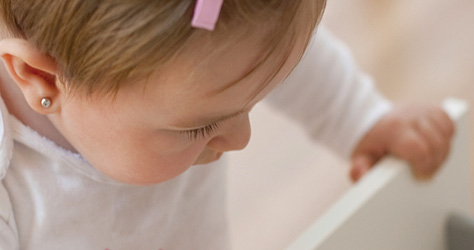Supervision, monitoring and common sense are key to sensible (sane) baby-proofing.
Sane baby-proofing basically means pre-empting potential hazards, without suddenly viewing everything as a potential death-trap. Because each child and home is different, you need to identify the risks in your home rationally on an ongoing basis. Like so: Mr Fluffles the teddy? Probably fine. Your Samurai sword collection? Probably needs to go in the loft.
At a glance
- Get a Fire Safety Check by contacting your local Fire station
- It’s never too early to invest in stair gates and board-up open banisters
- Keep an eye on what they are putting in their mouths and keep small, potential choking hazards out of reach

In case of an emergency
A Baby First Aid course is a great idea and could make all the difference if faced with an emergency situation. Search for courses in your area. Likewise, fit smoke and carbon monoxide detectors. Get a Fire Safety Check by contacting your local Fire station. They will send uniformed Fire Officers to your home for free. Though you may want to do this every Friday night, you probably only need to do it once…
Rock n rollers
It’s surprising how far babies can roll whilst unattended. Put them into a crib or baby-seat before you leave them room. It’s also never too early to invest in stair gates and board-up open banisters.
Sleep safety
The Lullaby Trust has provided us with this great guide to sleep safety. Ensure that your moses basket and cot are sturdy and placed away from windows. Cut and tie up any cords or pulleys for blinds so that they are well out of reach.
Babies are slippery!
Invest in a non-slip baby bath. Supervise babies around water at all times. If the phone or doorbell rings either ignore it or take your baby with you.
Tasters
Your baby will initially want to understand the world around them by putting things in their mouths and tasting it like an over-excited celebrity chef. Always keep a close eye on what they are putting in their mouths and keep small, potential choking hazards out of reach. be especially careful with dishwasher and washing tablets/liquitabs. Hospitals say they see more and more children who've bitten into tablets, presumably because they think they are sweets as they often have soft textures and bright colouring.
Also be especially aware of the dangers of button batteries which can cause internal harm or even be life threatening if swallowed. This is why the advice is to go straight to A&E, regardless of symptoms as an X-ray may be needed and it removed immediately. Likewise if your child has a button battery lodged in their ear or nose they should be seen urgently.
Lock-down
Between six and twelve months your baby will begin grabbing. And crawling. This, combined with putting everything in their mouths, is why it’s a good idea to child-lock cupboards and drawers. It isn’t just domestic products which could be harmful. Some houseplants can be poisonous if eaten – not to mention that squishing soil into the carpet really is great fun! It’s probably best to keep them out of reach. Childproof window locks and plug safety covers also come into their own around this time.
Kitchens
Babies and kitchens aren’t the best combination. Oven doors get hot and pans can spit. Keep pans at the back of the hob with handles facing away. Hot drinks and food shouldn’t be carried near babies. When eating or cooking, put your baby in a safe chair, play-pen or crib until you are able to supervise them.
Cruising
Cruising is the phrase used to describe the way that many babies pull themselves up on furniture before learning to walk. This is where the exciting new sport of bookcase mountaineering really can get your adrenaline going. For this reason, it’s a good idea to make sure furniture is secured and won’t fall.
Walking
Babies begin to walk between around eight and 18 months. Falls are a normal part of this process. It’s a good idea to make sure sharp corners are padded. And all that stuff you put out of their reach? That might need to go up higher now. Remember that other peoples’ homes may not be as baby-proofed as yours so keep a close eye on them when out and about.
Want to know more about keeping them safe when out and about? Read our guide to Babies and Car Safety. Thinking about the next steps? Check out our advice on Toddler and Pre-school safety…